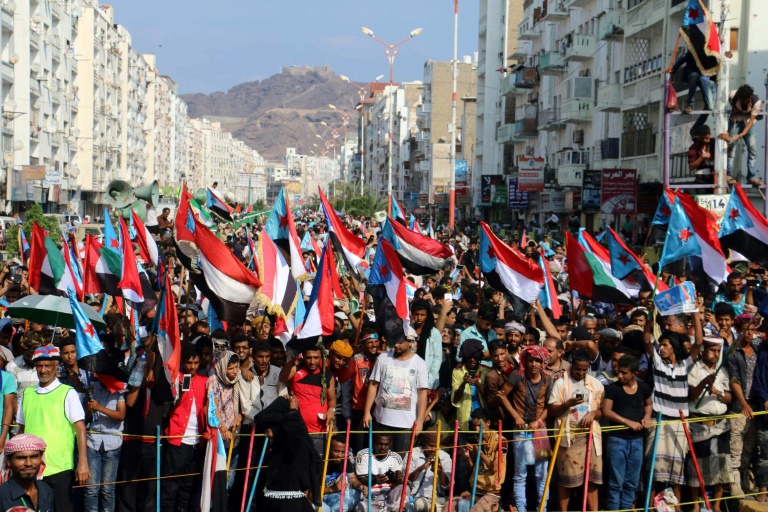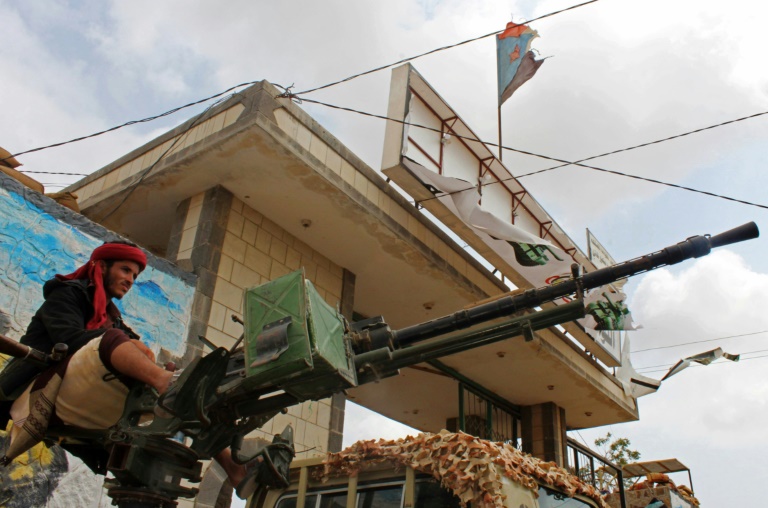At least 139 fighters dead in Yemen
The situation in Yemen is described by the United Nations as the world's worst humanitarian disaster.

A displaced Yemeni child sits next to a cooking area at a make-shift camp for displaced people where they are taking shelter in the Maafir area, on the outskirts of Yemen’s Taez province on May 12, 2018. / AFP PHOTO / Ahmad AL-BASHA
Yemeni pro-government forces closed in on a rebel-held airport today as they pressed a sweeping offensive on a key Red Sea port city, sparking UN fears for vital aid shipments.
Fighting has raged around Hodeida, the entry point for the vast majority of Yemen’s imports, since the Wednesday launch of a sweeping Saudi and UAE-backed operation to seize it from Huthi rebels.
The battle has since killed at least 139 fighters, according to medical and military sources.
The assault has sparked fears for the area’s 600 000 residents, with aid and rights groups warning it could spell disaster across Yemen, a country already teetering on the brink of famine.
The capture of Hodeida would be the Saudi-led coalition’s biggest victory in a three-year war that has claimed over 10 000 lives and displaced millions.
Neither Saudi and Emirati-backed government forces nor the Huthi rebels show any signs of backing down in the fight for Hodeida.
The city and its port have been under Huthi control since 2014, when the Iran-backed insurgents drove the government out of the capital Sanaa and much of the country, forcing President Abedrabbo Mansour Hadi to flee into exile.

Yemeni supporters of the southern separatist movement wave its flag during a rally in the southern port city of Aden on October 14, 2017.
‘Quagmire for invaders’
Huthi chief Abdelmalik al-Huthi urged his forces Thursday to keep fighting, saying they would recapture areas taken by pro-government forces and turn Yemen’s western coastline into a “quagmire for the invaders”.
Huthi urged his troops to “confront the forces of tyranny”, warning they would recapture areas taken by pro-government forces by bringing “huge numbers” of fighters to the battle, according to the rebels’ Al-Masirah TV.
Military and medical sources say the vast majority of those killed in three days of fighting were rebels.
But a rebel attack along the coast today left 12 soldiers dead.
A military official told AFP today the government alliance had approached to within just two kilometres of Hodeida’s international airport, just inland from the port.
The disused airport serves as a base for Huthi ground forces.
But a Huthi attack some 80 kilometres (50 miles) south of the city provided a diversion, cutting loyalist forces off from the government-held ports of Khokha and Mokha, sparking fresh clashes along the coastline.
Hodeida airport has been defunct since 2014, when Yemen’s rebels seized the capital and drove the government south, prompting the intervention of Saudi Arabia and its allies six months later.
The ground offensive south of Hodeida is led by the United Arab Emirates, a key ally of both Saudi Arabia and the US military.
The UAE said four of its troops were killed on the first day of the offensive.

A southern separatist militiaman takes up position in Aden on January 31, 2018, after the force overran nearly all of Yemen’s second city, besieging government ministers in the presidential palace.
‘Devastating impact’
The United Nations, which has described Yemen as the world’s worst humanitarian disaster, on Thursday demanded the port to be kept open to deliveries of vital food and aid supplies.
The Security Council, the only UN body with the power to pass legally binding resolutions, on Thursday brushed aside a call by non-permanent member Sweden for a pause in fighting to allow for talks on a rebel withdrawal from Hodeida.
Aid groups warned a major humanitarian catastrophe was looming as fighting drew closer to Hodeida.
The UN estimates some 600 000 people live in and around the city.
Human Rights Watch said today the battle for Hodeida could be disastrous for civilians across the country.
“The battle for Hodeida could have a devastating impact on civilians both in the city and elsewhere in Yemen,” said Sarah Leah Whitson, HRW’s Middle East director.
“The UN Security Council should urgently warn senior officials on both sides they will face sanctions if they fail to provide civilians access to desperately needed aid.”
For more news your way, follow The Citizen on Facebook and Twitter.







